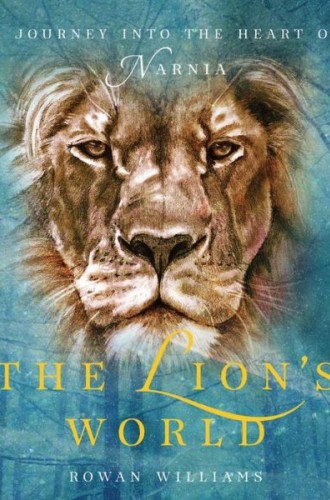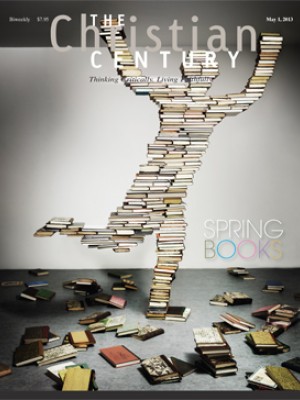The Lion’s World, by Rowan Williams
Who would have thought that a new book on C. S. Lewis could bring fresh, even revolutionary insight to perhaps the most overstudied Christian writer in the anglophone world? The Lion’s World is such a book.
Countering Christian acolytes, who hail Lewis as the super-certain apologist, and Philip Pullman–like detractors, who damn Lewis as a poisonous racist, sexist and sadomasochist, Williams contends that there is a largely undiscovered Lewis to be found in his Narnia novels. Williams confesses that the Narnia books lack the rich mythography of Tolkien’s Lord of the Rings, that they contain bothersome inconsistencies and infelicities and that Aslan sometimes resembles a sword-wielding Crusader more than a crucified Lord. Even so, they furnish what Lewis’s formal defenses of Christian faith often lack: a convincing encounter with the disruptive and subversive truthfulness that is God and God’s world. They enable readers to experience the depth and difficulty of belief, to sense the complexity of human and divine realities that Lewis elsewhere turns into ghostly abstractions.
Williams never mentions the books on which Lewis’s reputation as an apologist largely rests: Mere Christianity, Miracles, The Problem of Pain. For him, the best of Lewis is located in his fiction: The Screwtape Letters, The Great Divorce, That Hideous Strength, Till We Have Faces, but principally the Narnia books. This is not to say that Williams regards these more imaginative works as illustrations of Lewis’s theological ideas. They are not easy allegories offering coded links between Aslan and the incarnation, or between his death and the doctrine of substitutionary atonement. Instead, they are stories whose moral truth and religious insight emerge from plot and character, from scene and tone and atmosphere.
Read our latest issue or browse back issues.
Neither is there any necessary congruence between Lewis’s fiction and his apologetics. Lewis’s single most infamous one-sentence theodicy is found in his claim that “pain is God’s megaphone to arouse a deaf world.” Suffering souls within my own small range of friendships have been so outraged at this endorsement of agony that they have vowed never to take Lewis seriously. Williams shows that Aslan refuses such glib assurances in Narnia. In a dream sequence in The Silver Chair, for instance, Jill asks for the Lion’s permission to drink from a clear stream of water that divides them, but only if the noble beast will guarantee her safety. “I make no promises,” Aslan answers.
Alarmed at this refusal, Jill desperately presses the Lion: “Do you eat girls?” In a response hardly meant to comfort children (or adults!), the creature flatly denies that suffering is meant for soul-making:
“I have swallowed up girls and boys, women and men, kings and emperors, cities and realms,” said the Lion. It didn’t say this as if it were boasting, nor as if it were sorry, nor as if it were angry. It just said it.
When Jill declares that she will then seek another river of life, the Lion responds with the same dispassionate objectivity: “There is no other stream.” Unlike the brittle theodicy of The Problem of Pain, this is a clear confession of the claim made by Orual, the narrator-protagonist in Till We Have Faces: “The divine nature devours us merely for being what it is.”
The genius of the Narnia chronicles, in Williams’s estimate, may lie in Lewis’s decision to embody his Christ-figure not as a human but as an animal creature. It enables him to narrate the terrible risks entailed in God’s making and remaking of the world. God works through secondary causes and probability-driven chances, Lewis hints, that do not spare even the most faithful, just as human action often produces unintended horrors of body and soul alike. “One thing Aslan cannot do is pretend he is not what and who he is,” Williams writes.
Under his scrutiny the likelihood is that we shall all feel as unsafe as it is possible to be. . . . He cannot be other than truth. And confronted with truth in this shape, there may be no promises, no rewards and no security. But there is nowhere else to go.
Clearly Williams’s Lewis is not the hale and bluff defensor fidei derided by his Oxford enemies as “Heavy Lewis.” It is a much more delightful and considerably less tidy Lewis. In The Lion, the Witch, and the Wardrobe, Aslan stages a Christmas party whose joyfulness outrages the White Witch, just as he also breathes life into creatures whom she had petrified. In Prince Caspian, Aslan’s freedom is depicted as nothing less than riotous. There the god Bacchus and the drunken Silenus help celebrate a liberation “that extends from nature spirits to schoolchildren.” It is the devils whose rigidly ordered world depends on suffocating orthodoxies and oppressive clichés. Nor is Lewis Platonic about sex. In both That Hideous Strength and A Grief Observed, he makes evident that “erotic satisfaction fully enjoyed is one of the most powerful glimpses we can have of what union with God is like.”
Williams’s most daring claim is that Narnia constitutes no layer-cake land of lower and higher things, no parallel realm of shadows and realities. It is Israel and the church, and thus the realm of grace: “the unplanned and uncontrolled incursion into our self-preoccupied lives of God’s joy in himself.” There we encounter the truth that disentangles “our most ingenious strategies for avoiding what we most want,” the delight that dissolves our vaunted self-possession. Narnia is indeed “the Lion’s World,” appealing to those who think they have dismissed Christianity as well as to Christians who have domesticated their faith.







